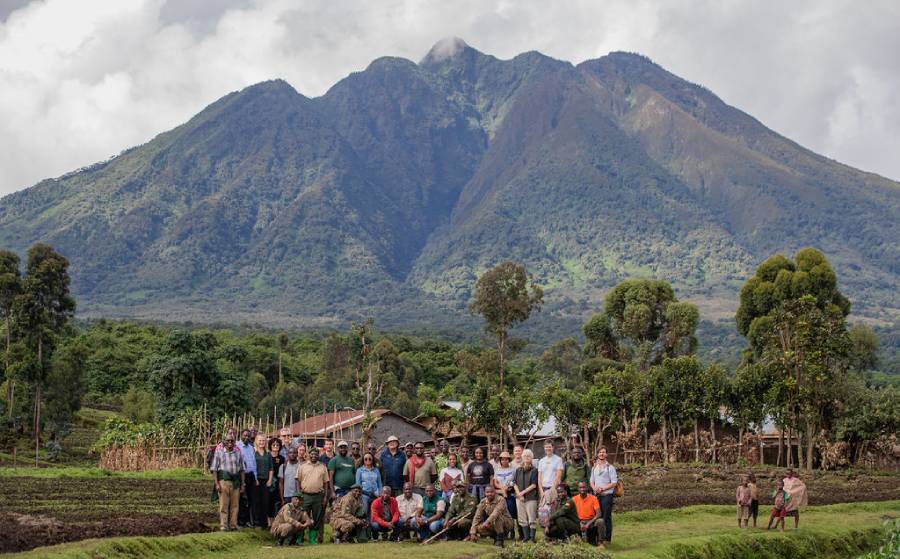
Albertine Rift Ecosystems and Great Apes: Conservation Challenges 2022 to 2050 – an overview of the retreat at Mount Gahinga Lodge
If you’ve been following Diary of a Muzungu for a while, you’ll know how passionate I am about conservation. I was therefore delighted to be invited to help document Volcanoes Safaris’ conservation retreat at their fabulous Mount Gahinga Lodge. This is the first in a series of posts and podcasts I’ll be publishing about the weekend’s fascinating conversations.
Volcanoes Safaris was honoured to host the “Retreat on The Albertine Rift Ecosystems and Great Apes: Conservation Challenges 2022 to 2050” at Mount Gahinga Lodge in the Ugandan foothills of the Virunga volcanoes. The retreat was the culmination of a series of events in 2022 to celebrate Volcanoes Safaris’ 25th anniversary.
Welcome to Mount Gahinga, Volcanoes Safaris’ first lodge, by Praveen Moman
Praveen Moman, founder of Volcanoes Safaris welcomed everyone to Mgahinga “the playground of Volcanoes Safaris” an area that Praveen has been visiting with his family since the age of 12 and the location for Volcanoes Safaris’ first lodge: Mount Gahinga. Praveen took the opportunity to thank the assembled gathering for the collaboration, partnership and perseverance and to make an impassioned plea to find solutions.

Participants acknowledged that big strides have been made in conservation. Johannes Refisch (UN Great Apes Program / UNEP Nairobi) pointed out that mountain gorillas are the only great ape species whose numbers have increased in the past decades. Dr Gladys Zikusoka-Kalema of Conservation Through Public Health noted that mountain gorillas are important to government revenue, commenting “We have a gorilla on a Ugandan banknote.” However, the growing human population, climate change, risk of disease, regional insecurity and other factors will continue to exacerbate environmental challenges.
“Welcome to Uganda’s smallest National Park” by Uganda Wildlife Authority
The weekend’s events started with a short walk in the National Park led by Praveen Moman and Richard Muhabwe, Senior Warden, Uganda Wildlife Authority. Muhabwe welcomed everyone to the 33.7 km square Mgahinga Gorilla National Park (MGNP), part of the greater Bwindi Mgahinga Conservation Area. This transboundary Park, contiguous with Volcanoes National Park in DRC and Rwanda, is popular for tracking the Nyakagezi family of nine mountain gorillas, golden monkeys, nature walks and volcano hiking of Mount Muhabura, Mount Gahinga and Mount Sabyinyo, borders the three countries.
Muhabwe’s welcome speech highlighted many of the environmental challenges that were to be discussed over the coming days. Climate change has led to flooding: mudslides on Mount Muhabura killed ten people and damaged property earlier in 2022. Climate change exacerbates the presence of invasive (plant) species that replace foliage that should feed wildlife. Human wildlife conflict is another local challenge: a 16 km long stone wall along MGNP’s boundary stretches from the border of the DRC to the border of Rwanda and prevents buffaloes straying from the National Park to destroy crops.

One of the highlights of the retreat was an exuberant song and dance display by the villagers who reside in the Batwa Village built on land purchased by Volcanoes Safaris Partnership Trust and other well-wishers. Jane Nyirangano, chairperson of the Gahinga Batwa Village, thanked VSPT for their interventions.
The purpose of the retreat
Participants at the informal conservation retreat discussed the successes and challenges of the past 25 years of conservation in the Albertine Rift and brainstormed ideas and solutions for ensuring the habitats, parks and wildlife, including the endangered great apes, survive for the next 25 years.
The aim of the retreat was to stimulate new ways of collaboration. It was an opportunity to speak openly about participants’ perspectives, fears and ambitions for this fragile region. By having a longer-term goal, participants were free to imagine a range of scenarios (in contrast to most meetings which tend to focus on the more immediate future). The fundamental questions revolved around: what are we doing right? What else are need to do? Is it a question of scaling up current interventions? Or do we need to adopt new approaches?
We cannot just put wilderness on a pedestal; we need to put bread on the table of local people. We need to use the private sector to be the engine of growth, to deliver business plans, to organise service delivery. We need Protected Area managers and conservationists to look after our species, and veterinarian and disease specialists to safeguard species’ health and protect them for the future. We need to join what’s happening outside a park with what’s happening inside a park. We need to make people part of the conservation chain. We need to make this the beginning of the campaign to save the Albertine Rift.
Praveen Moman, Founder, Volcanoes Safaris
Who attended the retreat
Participants came from across the region: wildlife vets, primatologists, researchers, safari guides, wildlife rangers, National Park law enforcement and tourism wardens, foresters, and other conservationists; hospitality consultants, tour operators, development experts, private financiers, community outreach (Herbert) and media.
The retreat was co-moderated by Conservation Consultant Alastair McNeilage and Johannes Refisch of UN Great Apes Program / UNEP Nairobi.
Participants were invited to make short, simple presentations on topics of relevance to conservation in the Albertine Rift.
Key conclusions of the retreat
- It’s important for stakeholders to consider the Albertine Rift – Uganda, Rwanda and the DRC – as one region and to have a long-term vision for addressing the area’s various challenges.
- Concrete steps must be taken to maintain connectivity between small, isolated islands of habitat. This will help make ecosystems more resilient to the impacts of climate change.
- The threat of more human diseases affecting great apes is significant so veterinary care and technology will remain critical.
- Conservation needs to be part of the economic mainstream for governments and communities to support the continued presence of protected areas in regions where human populations continue to rise.
- Local communities must benefit from conservation and tourism. They have a stake in the future of great apes and protected areas and must be involved in development plans.
- Tourism can bring significant revenue, but the pandemic has taught us that conservation and communities cannot rely on one sole source of funding. New business models for protected area management must be actively considered. Innovative models have been successfully implemented across Africa. Public-private partnerships, for example, approach conservation management as a business that can cover the protected area’s operational costs and directly benefit communities involved.
- Collaboration between conservation organisations and the private sector needs to be developed further. Long-term involvement of researchers, new investment in parks, and application of private sector skills such as ‘business thinking’ and service delivery are important in sensitively developing natural resources and creating ‘professional tourism products’ for sale to visitors.
- Gorilla and chimpanzee tourism must be sensitive and controlled in line with the established protocols so that it does not negatively impact the species or habitat. Tourism protocols need to be strictly followed by park authorities, tourism intermediaries and visitors.
- Investment in conservation education for the next generation of young Africans is critical, to ensure that young people are educated and inspired to support conservation and tourism. The need for quality education is particularly important for the indigenous Batwa population. Forcibly removed from their forest home, these conservation refugees need a direct benefit from tourism in order to lift their communities out of poverty and help find peaceful human / wildlife co-existence. Conservation education should be an integral part of all stakeholders’ activities.
- The retreat agreed to create an informal group: The Albertine Rift Conservation and Tourism Group whose aim is to become a long-term advocacy and information network for those involved in this subject area. The focus of the group is to take collaborative action to deal with specific policy issues, threat to a particular species or a habitat or community issue. The group should maintain regular contact, either as a whole or in sub-groups, possibly every quarter through written exchanges, Zoom calls or physical meetings.
Outputs of the retreat
- The Albertine Rift Conservation and Tourism Group is led by Conservation through Public Health and Volcanoes Safaris. The inaugural meeting was held 22nd November 2022 in Kampala.
- The stakeholders agreed to meet every year, bringing in other partners as appropriate, to review progress. The Dian Fossey Gorilla Fund offered to host the next meeting at their Ellen DeGeneres Campus, at Volcanoes National Park in Rwanda.
- The Albertine Rift Conservation and Tourism Group has proposed some informal groupings to support action in specific areas; each participant should decide whether they wish to participate in a sub-group.
- Responsible gorilla tourism. Topics include: conservation; disease; the gorilla-friendly pledge; adherence to IUCN and GRASP best practice guidelines; enhancing habitat connectivity.
Lead organisations: Conservation Through Public Health and Gorilla Doctors.
- Responsible chimpanzee tourism. Topics include: conservation; disease; enhancing habitat connectivity.
Lead organisation: Jane Goodall Institute.
- Friends of a National Park group. A group of stakeholders around each park could be created to:
- Enhance Community Livelihoods from tourism and conservation.
- Invest in the Next Generation: improving conservation education in communities, visits by school children to National Parks, creation of scholarships.
- Financing of conservation and raising awareness of conservation issues within the Albertine Rift. Pursue opportunities for developing PPPs or reviewing the cost/ benefit of restructuring park management.
- Raise issues with appropriate regional and international organisations and events including:
- Greater Virunga Transboundary Collaboration Secretariat
- Great Apes Survival Partnership (GRASP) Council meeting
- African Primatological Society conference in 2024 in Gabon
- Congo Basin Forest Partnership
- International Congress for Conservation Biology (ICCB 2023), July 2023 in Kigali, Rwanda
- Wildlife Conservation Society (WCS)
- World Wildlife Fund (WWF)
About the Albertine Rift
The Albertine Rift stretches from Murchison Falls in northern Uganda to Kahuzi-Biega in the DRC. It is one of the richest areas of biodiversity in the world and one of the most densely populated areas of Africa.
About Volcanoes Safaris and the Volcanoes Safaris Partnership Trust
For 25 years, Volcanoes Safaris has been at the forefront of reviving tourism in Uganda and Rwanda and is recognized as the region’s leader in gorilla and chimpanzee ecotourism. Volcanoes Safaris was the first company to set up simple camps in the areas around Uganda’s gorilla parks. Today Volcanoes Safaris has three lodges in Uganda: Mount Gahinga Lodge at Mgahinga National Park; Bwindi Lodge, bordering Bwindi Impenetrable Forest; and Kyambura Gorge Lodge, overlooking Queen Elizabeth National Park, neighbouring a gorge with a community of threatened chimpanzees.

In 2000, Volcanoes Safaris became the first international safari company to take clients to Rwanda and in 2004 opened Virunga Lodge, the first international company to build a lodge near the gorilla park after the war. Virunga Lodge is winner of Condé Nast Traveler readers’ choice awards 2017, 2021 and 2022.
Volcanoes Safaris: recognised leaders in great ape tourism
Volcanoes Safaris helped kick-start gorilla tourism in Rwanda after the genocide through the Volcanoes BLCF Partnership Project. In 2005 the company become a charter signatory to the UN Kinshasa Declaration on Saving the Great Apes, the only private sector company to do so. In 2009, the Volcanoes Safaris Partnership Trust (VSPT), a non-profit organisation that aims to create long-term, self-sustaining projects that enrich the livelihoods of local communities and promote the conservation of the great apes, was established.
In 2013, Praveen Moman, the founder was asked to join the Congo Basin Forest Partnership, which promotes sensitive economic development of the forests of Central Africa. Praveen has been described as a ‘visionary conservationist’ by the Financial Times and as ‘one of top twenty-five conservation-philanthropists’ in Africa by Departures Magazine. In 2021 Praveen was named winner of the Newsweek Future of Travel Awards.
About the retreat
The retreat took place at Mount Gahinga Lodge between November 12-14 2022. The next retreat will take place in one to two years’ time.
“We need the wisdom of all you, of your elders, of those who have gone before, of your institutions, to work together.”
Praveen Moman, Founder, Volcanoes Safaris

For further information
If you’re are interested in future meetings, you’re welcome to contact the Great Apes in the Albertine Rift steering committee via email albertineapes@gmail.com.
- Gladys Kalema-Zikusoka, Founder, Conservation Through Public Health.
- Jean Paul Hirwa, Dian Fossey Gorilla Fund
- James Byamukama, Jane Goodall Institute
- Alastair McNeilage, Conservation consultant
- Johannes Refisch, UN Great Apes Program / UNEP Nairobi
- Nick Radford, Wildlife Conservation Society
- Praveen Moman, Founder, Volcanoes Safaris

























